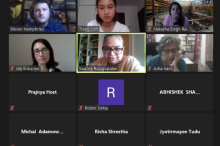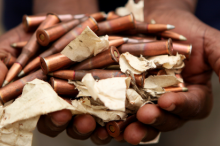Displaying 351 - 360 of 741
UNODA presents concrete actions in support of gender mainstreaming policies, programmes and actions in the fight against trafficking and misuse of small arms
The European Union and the United Nations Office for Disarmament Affairs (UNODA) in partnership with the International Action Network on Small Arms (IANSA) organized an event entitled “Supporting gender mainstreamed policies, programmes and actions in the fight against small arms trafficking and misuse, in line with the Women, Peace and Security agenda” on Friday, 30 October 2020. Over 90 people joined the virtual event which took place in the margins of the First Committee meetings and the open debate on Women, Peace and Security in the Security Council,…
Gender stereotypes seen as a key obstacle in tackling small-arms challenges
Entrenched expectations about women and men contribute to small-arms challenges around the world, staff from the United Nations Regional Centre for Peace and Disarmament in Asia and the Pacific (UNRCPD) told university students in early October. Small arms and light weapons impact women, girls, men and boys differently, and socially constructed assumptions about masculinity are significant contributors to perceptions of small arms, said Ms. Ida Scarpino, UNRCPD’s Gender and Small Arms and Light Weapons project coordinator. Disarmament efforts and activities under the women,…
Winners announced in first-ever Apps 4 Digital Peace Competition
The United Nations Office of Disarmament Affairs (UNODA), the Office of the UN Secretary-General’s Envoy on Youth, and Cybersecurity Tech Accord are proud to announce the first-ever Apps 4 Digital Peace competition winners: AllSafe, Maktab and Cyber Teens. The Young innovators developed original technology-based solutions to increase the stability of our online environment and limit the use of the internet as a domain of conflict. First Place ($15,000) FSociety presented a community-driven platform, AllSafe, to democratize cybersecurity and increase…
UNODA hosted virtual webinar at UNSCC’s Virtual Torino Forum 2020 on “Sustaining peace through leveraging WPS, YPS and disarmament approaches”
The United Nations Office for Disarmament Affairs (UNODA) hosted a virtual webinar focusing on bridging Women, Peace and Security (WPS), Youth, Peace and Security (YPS) and disarmament agendas on 8th September 2020, as a part of the United Nations System Staff College (UNSSC) Virtual Torino Forum on Sustaining Peace. Over 65 people attended the webinar, engaging with panelists and participating in interactive exercises. Three panelists shared their perspectives from government, youth champion and civil society and highlighted key aspects of the WPS, YPS and disarmament agendas as…
UNODA and Cybersecurity Tech Accord host the ‘App 4 Digital Peace Competition Virtual Awards Ceremony’
The High Representative for Disarmament Affairs, Izumi Nakamitsu, will join leaders from the technology industry, media, and foreign policy community, as well as young innovators, on Monday 21st September for the Apps 4 Digital Peace Competition Virtual Awards Ceremony. The Apps 4 Digital Peace Competition is a joint initiative by the UN Office of Disarmament Affairs (UNODA), the UN Office of the Envoy on Youth and Cybersecurity Tech Accord. The goal of the competition, launched in January and open to young innovators between 16 and 32 years…
With joint support from the African Union Commission and the United Nations youth contest for Africa Amnesty Month 2020 kicks off
This September marks another opportunity for the enforcement of African Union Decision 645 (XXIX) to reduce illicit flows of small arms and light weapons, strengthen ties between communities and law enforcement, and ultimately make everyone on the continent safer. During the September Africa Amnesty Month (SeptAAM2020), everyone can hand in illicitly owned weapons and contribute to reducing the number of uncontrolled small arms on the continent. September Africa Amnesty Month 2020 The success of this month-long campaign requires action by governments, civil…
Young leaders across Northeast Asia tackle challenging security questions in online education series
The nine-member youth Steering Committee for Disarmament and Non-Proliferation in Northeast Asia engaged with United Nations staff last week on a range of pressing international security challenges. Their webinar discussions were part of a wider learning series organized by the United Nations Regional Centre for Peace and Disarmament in Asia and the Pacific (UNRCPD) to help the young leaders prepare for an upcoming meeting in the Republic of Korea on disarmament and non-proliferation topics. Participants in the ongoing learning series are joining virtual educational…
Scores of young people train through 2020 ‘Scholarship for Peace and Security’
Students and young professionals from dozens of countries recently completed eight weeks of online training on an array of disarmament-related policy tools designed to help prevent and resolve conflict. The 135 young people were recipients of the 2020 Scholarship for Peace and Security, jointly organized by the Organization for Security and Co-operation in Europe (OSCE) and the United Nations Office for Disarmament Affairs (UNODA) in Vienna. The participants—122 of whom were women—together represented 53 OSCE participating States and Partners for Cooperation. The group was…
Youth discuss how to innovate responsibly and ‘secure our common future’
Science, technology, engineering and mathematics (STEM) students joined four UN-led online workshops last week to engage in discussions and activities about the impact of emerging technologies on global peace and security. The four sessions, which were part of the “Responsible Innovation for a Secure Environment” (RISE) Virtual Workshop Series, brought together over 30 students from Nanyang Technological University, the National University of Singapore and the Singapore University of Technology and Design. The students remained scattered across Asia and the Pacific due to the ongoing…
Students weigh security implications of emerging tech in new UN workshop series
Technology focused students met online this week to critically assess how emerging technologies could impact peace and security around the world. The students, all enrolled at leading Singaporean Universities, but currently spread across Asia and the Pacific due to the ongoing COVID-19 crisis, were able to take advantage of the organizer’s pivot to remote workshops and engagement tools. They were taking part in the launch of the “Responsible Innovation for a Secure Environment” (RISE) Virtual Workshop Series. Organized by the Office for Disarmament Affairs (ODA) and its United…